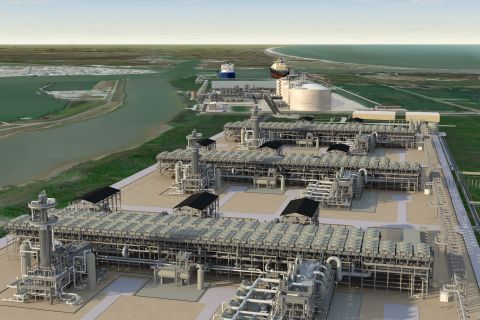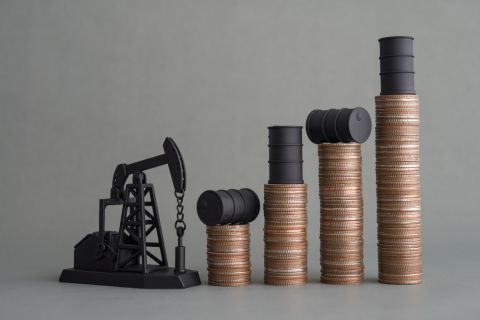OPEC and its allies are working towards a deal this week to reduce oil output by at least 1.3 million barrels per day (bbl/d), four sources said, adding that Russia's resistance to a major cut was so far the main stumbling block.
OPEC meets on Dec. 6 in Vienna, followed by talks with allies such as Russia on Dec. 7, amid a drop in crude prices caused by global economic weakness and fears of an oil glut due largely to a rise in U.S. production.
The producer group's de facto leader, Saudi Arabia, has indicated a need for steep reductions in output from January but has come under pressure from U.S. President Donald Trump to help support the world economy with lower oil prices.
Possibly complicating any OPEC decision is the crisis around the killing of journalist Jamal Khashoggi at the Saudi consulate in Istanbul in October. Trump has backed Saudi Crown Prince Mohammed bin Salman despite calls from many U.S. politicians to impose stiff sanctions on Riyadh.
RELATED: Oil Market Impact Of Jamal Khashoggi’s Disappearance
Oil prices rose more than 2% on Dec. 4, extending gains ahead of expected output cuts by producer cartel OPEC and a reduction in Canadian supply.
Benchmark Brent crude oil jumped by $1.89 to a high of $63.58 before easing back to trade around $63 by 1240 GMT. U.S. light crude was up $1 at $53.95 after earlier gaining more than 3% to an intraday high of $54.55.
The sources, three from OPEC and one from a non-OPEC producer, said the meetings were taking place in a difficult environment and that Russia's position would be key in reaching a deal.
"Russia is playing tough," one of the OPEC sources said.
Another OPEC source said: "The Saudis are working hard on the cut. But if Russia says no cut, then we [OPEC] won’t cut."
The Saudi and United Arab Emirates energy ministers, Khalid al-Falih and Suhail bin Mohammed al-Mazroui, said on Tuesday that an adjustment in global oil output was required but all producers must be on board.
"The next road to cross is whether all countries are willing to come on board and contribute to that cut," Falih told Bloomberg television.
Russian sources have indicated Moscow could contribute some 140,000 bbl/d to a reduction, but Middle East-dominated OPEC insists Russia cut by 250,000 to 300,000 bbl/d.
Two sources said talks were focusing on a pro-rata cut of 3% to 3.5% from October output levels, with no exemptions for any member.
Sources also said OPEC could delay a decision to cut if the main criteria such as Russia's involvement were not met, even though doing so would mean a further fall in prices.
"OPEC can always meet again in February, for example, and decide on a cut then. Those who were not able or willing to cooperate will be wanting to cut then," one source said.
Saudi Arabia previously insisted on a need to reduce production.
RELATED: Risking Trump Ire, OPEC Builds Case For Oil Production Cuts
It was unclear whether the apparent shift in position was caused by OPEC using negotiation tactics to bring Russia on board or by pressure from Trump to refrain from cutting output.
Damage Avoidance
Iraq's oil minister said OPEC must come up with a medium- to long-term strategy to achieve crude price stability and minimize damage to oil markets caused by geopolitics.
Thamer Ghadhban said Iraq would work to help balance markets and bolster prices. Iraq is OPEC's second-biggest producer after Saudi Arabia.
In October, OPEC pumped 32.916 million bbl/d, while its non-OPEC allies pumped 18.252 million bbl/d, according to the group’s internal data.
The non-OPEC source said a deal could still be done this week, though details remained unclear: "The Saudis and Russians have an agreement to cut. They are just working on the final details on the volumes and mechanisms."
Recommended Reading
Segrist: The LNG Pause and a Big, Dumb Question
2024-04-25 - In trying to understand the White House’s decision to pause LNG export permits and wondering if it’s just a red herring, one big, dumb question must be asked.
Texas LNG Export Plant Signs Additional Offtake Deal With EQT
2024-04-23 - Glenfarne Group LLC's proposed Texas LNG export plant in Brownsville has signed an additional tolling agreement with EQT Corp. to provide natural gas liquefaction services of an additional 1.5 mtpa over 20 years.
US Refiners to Face Tighter Heavy Spreads this Summer TPH
2024-04-22 - Tudor, Pickering, Holt and Co. (TPH) expects fairly tight heavy crude discounts in the U.S. this summer and beyond owing to lower imports of Canadian, Mexican and Venezuelan crudes.
What's Affecting Oil Prices This Week? (April 22, 2024)
2024-04-22 - Stratas Advisors predict that despite geopolitical tensions, the oil supply will not be disrupted, even with the U.S. House of Representatives inserting sanctions on Iran’s oil exports.
Association: Monthly Texas Upstream Jobs Show Most Growth in Decade
2024-04-22 - Since the COVID-19 pandemic, the oil and gas industry has added 39,500 upstream jobs in Texas, with take home pay averaging $124,000 in 2023.




